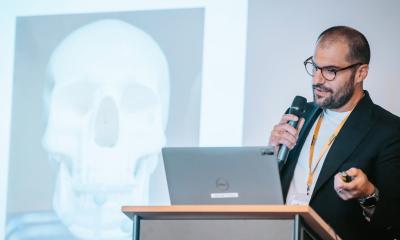Breast Cancer
Decision-making based on personalized data
No alcohol, but exercise and a healthy diet – that’s what women can do to help prevent breast cancer recommends Prof. Thomas Helbich (Director of Molecular and Gender Imaging at the Medical University of Vienna) who hosted the European Institute for Biomedical Imaging Research (EIBIR) session ‘The complexity of personalized breast care’ at ECR 2015.
Report: Chrissanthi Nikolakudi

His simple but effective advice indeed applies to everybody and to almost every form of cancer. But once breast cancer has been diagnosed, things aren’t that easy anymore. There is of course not a general therapy for every patient. Quite the contrary: personalized medicine is required to successfully fight breast cancer.
Treatment decisions should be the result of a multidisciplinary dialogue, said Ritse M. Mann, MD, PhD, Radboud University Nijmegen, NL, and speaker at the EIBIR session at ECR, involving surgical oncologists, clinical oncologists, radiation oncologists, breast imaging specialists, pathologists and many more. Until a few years ago, there was only one question to be answered when a tumour was detected: Is it operable, yes or no? Today, a whole slew of information is taken into consideration – patient data, family history and many factors that actually influence the outcome of a therapy. Incorporating radiation and systemic therapy may improve tumour control. The knowledge gained from the multidisciplinary data and associating the image-derived knowledge with known cases and known predictors for breast cancer risk and therapy success is the crucial step towards personalized therapy decision making. The effectiveness of this multidisciplinary approach opens up less invasive options for breast cancer patients.
VPH-PRISM is an EIBIR project on predictive breast cancer therapy that will provide a proof of concept for multidisciplinary model-based discovery of environment-tissue interactions, quantitative drug efficacy assessment, surgery planning, and treatment outcome prediction at early and advanced stages of breast cancer. The project’s Scientific Coordinator Professor Horst Hahn from Fraunhofer Mevis, Germany, also attended the session at ECR. The long-term goal of the project is to create a multimodal model using MRI, SWE and immunohistochemistry. This might help patients make decisions about their care based on personalized data.
EIBIR - The European Institute for Biomedical Imaging Research (EIBIR) is a non-profit limited liability company, dedicated to the coordination of research. EIBIR was founded in 2006 by the European Society of Radiology (ESR).
www.eibir.org
10.03.2015





